Iran sends a second wave of retaliatory strikes against Israel at the close of the day on Friday, which began with Israeli strikes on Iranian nuclear facilities. Read Euronews' report of the day's dramatic events as they happened here.
Iran launched hundreds of rockets at Israel in a second wave of attacks, causing some injuries and damage, as night fell after a day which began with Israel launching massive strikes across Iran overnight on Friday.
Israel's attacks targeted Tehran's nuclear programme, killing Revolutionary Guard Commander Hossein Salami, Chief of Staff Mohammad Hossein Bagheri, and Emergency Forces Commander Gholam Rashid and other military officials, as well as at least six top nuclear scientists.
In response, the Israel Defence Forces (IDF) said Iran had launched "approximately 100 UAVs towards Israeli territory," which were successfully neutralised.
Meanwhile, Israeli jets have struck multiple targets in the Iranian cities of Tabriz and Shiraz midday on Friday, according to Iran's state-run media.
US President Donald Trump has claimed that Iran was given a 60-day ultimatum to reach a nuclear agreement before Israel launched airstrikes on Iranian territory.
The Trump administration has insisted that Washington was not involved in Israel’s military operation.
Review how Friday unfolded as Euronews reporters from the region and around the world brought updates and reactions from the dramatic events in the Middle East.

 ${title}
${title}
Live ended
Iran launched under 100 missiles on Israel, IDF says
Iran has launched less than 100 missiles at Israel in two separate salvos on Friday evening, according to the Israel Defence Forces (IDF).
IDF spokesperson Avichay Adraee said that the majority of the rockets were intercepted or failed to strike their intended targets.
"There are a limited number of buildings that were hit, some due to shrapnel from interception operations," Adraee said in a post on X.
Tehran, which has vowed revenge following Israel's massive strikes on its military top and nuclear facilities overnight on Friday, has dubbed its retaliatory operation True Promise 3.
Two Iranian nuclear sites struck in Israeli attacks, says IAEA's Grossi
UN's nuclear watchdog chief Rafael Grossi said that two nuclear sites in Fordow and Isfahan have been struck by Israeli attacks on Friday, according to information from Tehran.
Speaking at the UN headquarters in New York, Grossi said Tehran informed the International Atomic Energy Agency (IAEA) of the strikes without providing further information.
The UN Security Council has met for an emergency session on Friday, following Israel's strikes on Iran's top military leadership and nuclear facilities.
Israeli defence minister: Tehran crossed 'red lines'
Following Iran's barrage of rockets on Israel on Friday evening, Israeli Defence Minister Israel Katz said Tehran has crossed "red lines" by targeting civilian areas of the country.
"Iran has crossed red lines by daring to fire missiles at civilian population centres in Israel," Katz said in a statement released to the media.
"We will continue to defend the citizens of Israel and ensure that the Ayatollah regime pays a very heavy price for its heinous actions," he added.
Baku 'categorically' denies rumours of deploying ethnic Azerbaijanis 'on behalf of Israel'
Azerbaijan has “categorically” denied social media rumours on Friday that “it recruited ethnic Azerbaijanis and deployed them into Iran on behalf of Israel.”
Hikmet Hajiyev, the Azerbaijan president’s foreign policy advisor, said on X that the allegations “have no connection to reality and constitute nothing more than disinformation”.
Iranian Azerbaijanis are the largest ethnic minority in the country, with a population reaching some 23 million or 24% of Iran's total population, according to estimates.
Israeli Defence Force says people can leave shelters but should stay close
Following a situational assessment, Israel's Home Front Command has now issued a statement that it is now permitted for civilians to leave protected spaces in all areas across the country and to remain near them.
The message was delivered via the Israeli Defence Force's telegram channel.
Injuries and rocket hits in Tel Aviv
A spokesperson for Israel's national ambulance service, Magen David Adom, has said five people have been injured and are being hospitalised in the Tel Aviv area. He said teams have been sent to search in seven locations of the city where there have been reports of strikes. Haaretz and Jerusalem Post have also reported five and 15 respectively injured. Amateur video shows bomb damage to Tel Aviv, and the country's Channel 13 television station is reporting that dozens of buildings and vehicles were hit by Iranian or interceptor weapons.
Israel hit by missiles as Iran retaliates for strikes on nuclear sites
Air raid sirens have sounded across Israel as Iranian missiles struck the country in retaliation for Israeli attacks on nuclear sites and military leaders, AP reports.
The rumble of explosions could be heard throughout Jerusalem on Friday night, and Israeli TV stations showed plumes of smoke rising in Tel Aviv after an apparent missile strike. There were no immediate reports of casualties. The army said dozens of missiles were launched, and the army has ordered residents across the country to move into bomb shelters.
Israeli media report hundreds of rockets incoming from Iran
Iran has fired hundreds of rockets towards Israel where sirens have been heard, according to reports in the Jerusalem Post and Haaretz. The Israeli Defence Forces sent a message to the population to take shelter. According to the local press.
by Sandor Zsiros
Israeli Defence Forces claim strikes against Iran's nuclear plant in Isfahan
Isfahan is one of three nuclear facilities not hit in the first waves of Israel’s attack on Iran on Friday.
Located around 350 km southeast of Tehran, Isfahan employs thousands of nuclear scientists. It is also home to three Chinese research reactors and laboratories associated with the country’s atomic program. Isfahan is considered Iran’s largest nuclear research complex.
Two other nuclear facilities not hit in the Friday morning attacks are at Fordow and Bushehr.
The Fordow facility is located some 100 km southwest of Tehran. It also hosts centrifuge cascades, but it is smaller than the Natanz facility. Earlier Iranian Fars news agency reported on X that explosions had been heard near that plant - that report has not been corroborated.
Iran is using Fordow to produce most of the near-weapons-grade uranium it has amassed since 2021.
The site is reportedly designed to withstand airstrikes as it is protected by anti-aircraft batteries. It is a heavily protected enrichment site built into a mountainside, which sits an estimated 80 metres under rock and soil.
Military experts previously said that it would require weaponry akin to a “bunker-buster” bomb, known as the “Massive Ordnance Penetrator”. Israel might need US help and support in providing this type of weapon.
The Bushehr nuclear power plant on the Persian Gulf, around 750 km south of Tehran, is Iran’s only commercial nuclear power plant.
Construction on the plant began under Iran’s Shah Mohammad Reza Pahlavi in the mid-1970s. After the 1979 Islamic Revolution, the plant was repeatedly targeted in the Iran-Iraq War. Russia later completed construction of the facility.
Iran is building two other similar reactors at the site. Bushehr is fuelled by uranium produced in Russia, not Iran, and is monitored by the IAEA.
by Sasha Vakulina
We can now confirm, IDF has carried out strikes against the nuclear plant in Isfahan ❗️
— LTC Nadav Shoshani (@LTC_Shoshani) June 13, 2025
This is in addition to operations in Natanz.
France would help defend Israel from Iranian attack if it can - Macron
France will take part in defending Israel in the event of an attack by Iran if it is "in a position to do so", French President Emmanuel Macron has told a press conference.
"We support Israel's security and if Israel were to be attacked, France would take part in operations to defend Israel if it is in a position to do so," Macron said, though he made clear that France wouldn't participate "in any offensive operation".
"We have always favoured the diplomatic route [on the issue of Iranian nuclear and ballistic missiles] rather than military intervention, so France did not recommend attacks by Israel," he said, underlining that France "didn't plan this decision with Israel".
Macron also addressed the situation in Gaza , renewing his call for a ceasefire in the enclave and his determination to recognise the State of Palestine.
"The events of last night must be seen in the context of the wider conflict being played out in the region, and in particular since the terrorist attacks of 7 October, the ongoing war in Gaza," he said, adding: "Under no circumstances should this make us forget Gaza."
"These attacks must not distract us from the need to establish a ceasefire there," the President added, describing the humanitarian blockade imposed in the Palestinian enclave as "unjustifiable".
Iran's army will 'cripple' Israel - Supreme Leader
Iran's Supreme Leader Ali Khamenei has recorded a televised address to the nation in which he has said that Iran's armed forces "will act with strength and will cripple the vile Zionist regime".
"The Zionist regime will not escape unscathed from this crime. The Iranian nation can rest assured that there will be no hesitation in this regard.”
Commander of Islamic Revolutionary Guard Corps' Quds Forces ‘killed in strikes’
The New York Times is reporting that commander of the Revolutionary Guards' Quds forces, Esmail Qaani, has been killed in strikes. If confirmed that would bring to seven the list of top military brass Israel has removed in its operations today. Here's a recap of who they are:
1. Major General Hossein Salami – Commander-in-Chief of the Islamic Revolutionary Guard Corps (IRGC)
2. Major General Mohammad Bagheri – Chief of Staff of the Iranian Armed Forces
3. Brigadier General Gholamali Rashid – Commander of Khatam al-Anbia Central Headquarters
4. Brigadier General Amir Ali Hajizadeh – Commander of IRGC Aerospace Force
5. Brigadier General Esmail Qaani – Commander of the Quds Force
6. Brigadier General Rabani, Deputy for Operations at the General Staff of the Armed Forces,
7. Colonel Reza Ahmadi – Head of Iran’s UAV Coordination Unit
Explosions heard near Fordow nuclear site - Iranian news agency
Iran’s Fars news agency has reported on X that two loud explosions heard near to Fordow nuclear site, one of two nuclear enrichment sites located in the north of Iran, close to the city of Qoms.
by Sandor Zsiros
لحظاتی پیش صدای ۲ انفجار از محدودهٔ سایت فردو به گوش رسید و ۲ نقطه از سطح زمین در محدوده فردو هدف قرار گرفته شده است.
— خبرگزاری فارس (@FarsNews_Agency) June 13, 2025
سایت اتمی فردو در عمق چندصد متری زمین قرار دارد. pic.twitter.com/8PyJ8Bq2sQ
Where did Israel hit, and what's next?
Israel hit Iran on Friday night, targeting strategic sites, senior leaders and nuclear scientists. What are Israel’s primary targets in Iran, and what are the important sites of Iran’s nuclear programme that Israel has not hit in its Friday attack?
Check out the details in this article by Euronews' Sasha Vakulina:
What has Israel hit in Iran and what has it not attacked yet?
Israel hit Iran on Friday night, targeting strategic sites, senior leaders and nuclear scientists. What are Israel’s primary targets in Iran, and what are the…
Media reacts across the Middle East
Israel's massive strike on Iranian nuclear facilities and top military commanders overnight on Friday ignited not only regional tensions but also placed the regional media on high alert, leading to varied reactions across the region.
Read more in the press review by Euronews' Arabic and Persian teams here:
How did the media in the Middle East cover Israel’s strike on Iran?
Israel’s massive strike on Iranian nuclear facilities and military officials has heightened regional tensions and led to varied media coverage across the Middl…
France ups domestic security in response to Middle East conflict
French schools, places of worship, public buildings, public festivals and gatherings and places of interest for the French Israeli, American and Jewish communities are all the focus of a call for greater security given out by France's interior minister Bruno Retailleau today.
In a letter seen by Euronews addressed to the minister of defence, the heads of the army, police and other security chiefs, Retailleau said that deteriorating situation in the Middle East following Israel's strikes on Iran necessitated implementation of immediate action to increase security within France.
In addition to calling on a beefed up police presence and extra vigilance, the note also called for efforts to track individuals, "particularly Iranians or those with links to Iran", already of interest to French authorities in the context of anti-radicalisation.
by Alice Tidey and Jeremy Fleming-Jones
New Revolutionary Guard commander warns of opening 'gates of hell'
Mohammad Pakpour, the newly appointed commander of Iran’s Islamic Revolutionary Guard Corps, has threatened to open “the gates of hell” in retaliation for Israel’s attacks that killed his predecessor, Hossein Salami.
“In retribution for the blood of our fallen commanders, scientists and citizens, the gates of hell will soon be opened upon this child-killing regime,” Pakpour said of Israel in a letter to Iran's Supreme Leader, carried by Iran's state news agency IRNA.
Iran planned surprise attack on Israel, claims Israeli UN ambassador
Israel's ambassador to the United Nations, Danny Danon has given reporters an update on the Israeli strikes against Iran, claiming that in "recent months, the Iranian threat took a dramatic turn", and that Israel's nuclear capabilities "advanced significantly".
Iran has enough material for "multiple nuclear weapons", Danon claimed, and Israel found evidence that Iran planned a surprise attack and was planning to "invade" Israel, which acted to protect its citizens".
"We won't sit quietly while our people are targeted, not again, not ever. Empty words will not stop Iran. Israel will," said Danon.
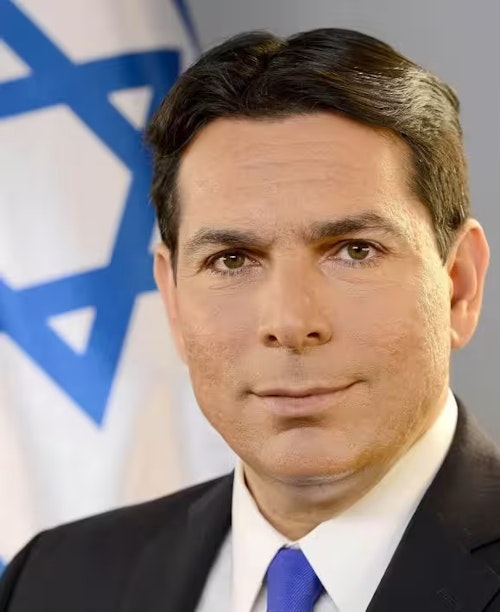
Erdoğan denounces Israel for 'heinous' and 'rule-breaking' strikes
Turkish President Recep Tayyip Erdoğan, a long-time vocal critic of Israeli Prime Minister Benjamin Netanyahu, has delivered an excoriating assessment of the situation in the Middle East.
In a post on social media, written in Turkish, Erdoğan described Israel's military operation as a "clear provocation that disregards international law" and a "heinous attack against our neighbor Iran".
"These attacks," he said, "demonstrate Israel's rule-breaking mentality."
"The Netanyahu administration is trying to drag our region and the entire world into disaster with its reckless, aggressive and lawless actions," he went on.
"The international community must put an end to Israeli banditry that targets global and regional stability. The attacks of Netanyahu and his massacre network, which are setting our entire region on fire, must be prevented."
by Jorge Liboreiro
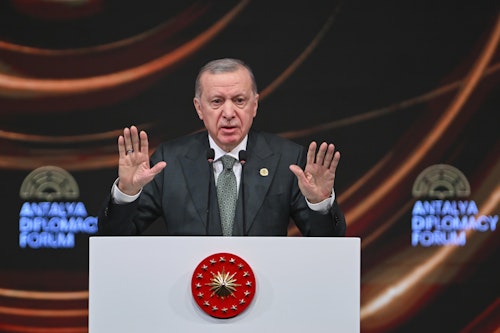
Internet restrictions implemented in Iran
“Temporary restrictions” on internet connections have been put into place across Iran, according to the country’s Information and Communications Technology Ministry.
The government added that the restrictions would be lifted when the “situation returns to normal.”
Following Israel’s strikes, internet connection has reportedly been impacted in certain areas of the country, as well as access to VPNs.
EuroVerify was not able to confirm the extent of these restrictions, however they could hinder reporting and the ability to independently check information coming out of Iran in real-time.
Internet access is in any case heavily restricted and monitored in Iran, while major social networks are banned.
by Estelle Nilsson
Confirmed: Israeli military continues to hit targets in Iran
The Israel Defence Forces (IDF) has confirmed that "Operation Rising Lion," the military campaign launched overnight against Iran, is still ongoing.
The IDF said it continues to "strike targets inside Iranian territory."
Israel began its wave of airstrikes overnight, claiming it was targeting nuclear facilities and senior military officials. Both the IDF and Iranian authorities have confirmed the deaths of several high-ranking commanders. Iranian state media reports that six nuclear scientists were also killed.
Unconfirmed reports from Iranian outlets say eight people were killed in the city of Tabriz, and at least 78 others in Tehran province.
Tel Aviv: Eerily quiet and cancelled Pride Parade
Many Israelis are hunkered down close to home in Tel Aviv, the country’s economic hub on the Mediterranean coast.
Shops were open but the streets, beaches, and parks were mostly deserted. Earlier Friday, many people had rushed to supermarkets to buy bottled water and other supplies, writes Associated Press.
The city canceled its annual Pride Parade, which normally draws tens of thousands of people for a march and street party.
Photos showed empty airport terminals, beaches and streets in the normally bustling city.
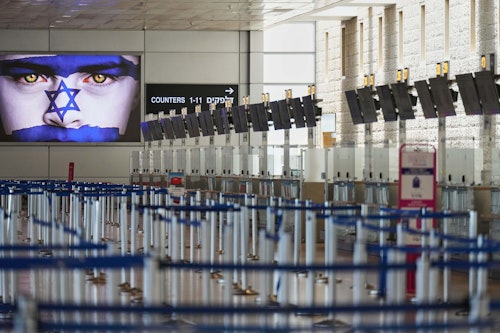
Israel's Ben Gurion Airport is empty of passengers.
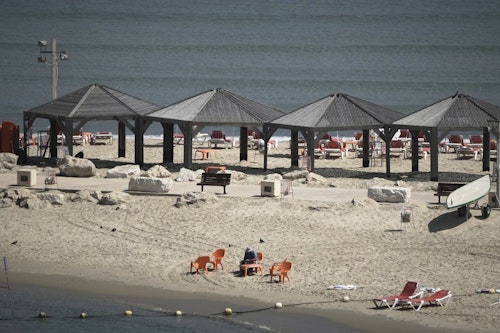
A man sits on the empty beach along Tel Aviv's beachfront.
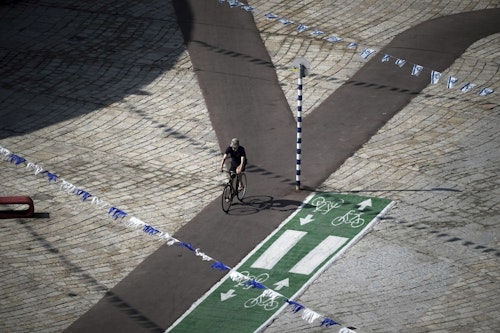
A man rides a bicycle along the empty promenade on Tel Aviv's beachfront.
UN Security Council to meet Friday
The United Nations Security Council has announced it is set to meet on Friday following Israel’s strikes on Iran, according to diplomatic sources. The emergency session is likely to take place Friday afternoon, the mission said.
Eight killed in Israeli strike on Tabriz
Israeli strikes killed at least eight and injured 12 others in Iran's north west Tabriz, Iranian state media reported.
Earlier, it said that there was an explosion near Tabriz airport, believed to have hit the Shahid Fakouri military base.
In a post on X, the IDF said it continued to attack Iranian territory.
China says Israeli strikes violate Iran's sovereignty and territorial integrity
China has reacted to the escalation in the Middle East, denouncing the Israeli strikes as a violation of "Iran's sovereignty" and offering to play a "constructive role" in easing tensions.
"China is closely following Israel’s attacks on Iran and is deeply concerned about the potential grave consequences of the operations," said Lin Jian, the spokesperson of the Chinese Foreign Ministry.
"China opposes actions that violate Iran’s sovereignty, security and territorial integrity, and opposes moves that escalate tensions and enlarge conflicts."
"The abrupt heating up of the region serves no one's interests," the spokesperson added. "China calls on relevant parties to choose the course of action that is conducive to the region’s peace and stability."
China and Iran are both members of the BRICS organisation and maintain close relations. Last year, Chinese President Xi Jinping described Iran as a "good friend and partner".
Israel launches fresh wave of attacks on Iran
Israeli strikes are currently targeting Mehrabad Airport in western Tehran and Bushehr Airport on the Persian Gulf, according to Israel’s Channel 12.
The report claims that Iranian warplanes are stationed at both bases.
At least 78 killed in Iran after Israeli strikes, semi-official state media says
At least 78 people have been killed and 329 injured in Israeli strikes on Tehran province, according to Iran’s Fars News Agency. It remains unclear how many of the casualties are civilians. Iranian media reports that among the dead are at least eight senior officials and six nuclear scientists.
Macron, Starmer and Merz hold joint call
French President Emmanuel Macron, British Prime Minister Keir Starmer and German Chancellor Friedrich Merz held a joint phone call to address the military escalation between Israel and Iran.
"They discussed today's Israeli strikes against the Iranian nuclear programme and Iran's military response and agreed to remain in close contact," a German spokesperson said, according to Reuters.
Although Merz took office only in early May, he has moved fast to develop close relationships with the leaders of Europe's largest nations, with a particular focus on Russia's war on Ukraine.
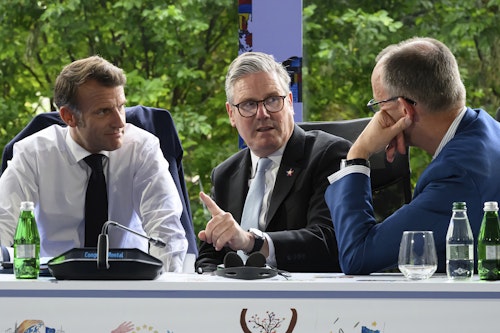
Netanyahu to hold calls with Trump, Starmer and Putin
Israeli Prime Minister Benjamin Netanyahu has posted on his X account about a series of calls he will make, including one with US President Donald Trump today.
He will also call British leader Keir Starmer and Russian President Vladimir Putin.
The Israeli leader has already spoken to Germany's Chancellor, India's Prime Minister and the French President.
Prime Minister Netanyahu, beginning last night, has held conversations with world leaders, including the German Chancellor, the Indian Prime Minister and the French President. He is due to speak with US President Trump, Russian President Putin and the British Prime Minister.
— Prime Minister of Israel (@IsraeliPM) June 13, 2025
Trump administration aware of attacks ahead of time, reports say
Israel informed the Trump administration in advance that it was planning large-scale attacks on Iran and warned that retaliation from Tehran could be severe, anonymous US officials told the Associated Press.
In anticipation of potential fallout, the US ordered the evacuation of some non-essential personnel from its embassy in Baghdad a day before the strikes. Similar authorisations were issued for staff at US embassies in Bahrain and Kuwait.
Despite rising tensions, special envoy Steve Witkoff still plans to travel to Oman this weekend for scheduled talks on Iran’s nuclear program. However, it remains unclear whether Iranian representatives will attend, officials said.
Secretary of State Marco Rubio reiterated after the strikes that the operation was a "unilateral" Israeli move and that the United States was not involved.
Trump: Iran had 60-day ultimatum before Israel strikes
US President Donald Trump has claimed that Iran was given a 60-day ultimatum to reach a nuclear agreement before Israel launched airstrikes on Iranian territory.
“They now have a second chance,” he added.
“Two months ago I gave Iran a 60-day ultimatum to ‘make a deal.’ They should have done it! Today is day 61. I told them what to do, but they just couldn’t get there. Now they have, perhaps, a second chance!” Trump wrote on Truth Social.
Despite Trump's comments, the Trump administration has insisted that Washington was not involved in Israel’s military operation. Iranian state media, however, has accused the US of collaborating with Israel in planning the strikes.
Talks between the US and Iran aimed at reviving a nuclear deal were scheduled to enter a sixth round on Sunday. It remains unclear whether the negotiations will go ahead, with Israeli media reporting that Tehran has withdrawn from the talks.
In an interview with ABC, Trump described Israel’s attack as “excellent” and warned there would be “more to come.”
Israeli strikes across Iran reportedly ongoing
As part of "Operation Rising Lion," Israel has launched a series of strikes across Iran.
Earlier, Iranian state media reported that Israeli forces targeted a military airbase near the northwestern city of Tabriz. Reports have also emerged of a possible second wave of strikes on Natanz, one of Iran’s key uranium enrichment sites.
Iran’s Atomic Energy Organisation confirmed that Natanz was hit overnight but said most of the damage occurred at "surface level."
Israel has described the strikes as hitting the "heart" of Iran’s nuclear programme, which it views as an existential threat.
Both countries implemented precautionary measures amid the heightened tensions. Israel closed access to the Al-Aqsa Mosque compound in occupied East Jerusalem for the first time since the COVID-19 pandemic, while Iranian authorities shut museums nationwide — a measure typically reserved for times of national crisis.
Israeli police closed Al-Aqsa compound to the public, bracing for a potential Iranian counterattack following its attack on Tehran early Friday.
— euronews (@euronews) June 13, 2025
Latest updates: https://t.co/zo8vCYh43v pic.twitter.com/qLzGieHget
Israel shuts all embassies after Iran attack
Israel is shutting down its embassies worldwide and has urged citizens to be alert and not display Jewish or Israeli symbols in public spaces.
No timeframe was given for how long the embassies would remain closed.
In Germany, a country with hundreds of memorials to Jews murdered in the Holocaust, Chancellor Friedrich Merz said that the country would be stepping up its protection of Jewish and Israeli sites.
Macron speaks with Trump and calls for 'maximum restraint'
French President Emmanuel Macron has offered his first public reaction to the military conflict between Israel and Iran, condemning Iran’s ongoing nuclear program and reaffirming Israel’s right to defend itself and ensure its security, while echoing political calls for "maximum restraint" and immediate de-escalation.
Earlier this morning, Macon convened the National Defence and Security Council to discuss the rapidly changing situation and take "all necessary steps" to protect French citizens and France's diplomatic and military officials deployed across the region, he said.
"France stands ready to work with all its partners to push for de-escalation in the Near and Middle East," Macron wrote on social media.
As part of his diplomatic outreach, Macron spoke with US President Donald Trump, with whom he is believed to be in regular contact, as well as with the leaders of Germany, the United Kingdom, Qatar, the United Arab Emirates (UAE), Jordan and Saudi Arabia.
"Peace and security for all in the region must remain our guiding principle," he said.
France has repeatedly condemned Iran’s ongoing nuclear program and has taken all appropriate diplomatic measures in response.
— Emmanuel Macron (@EmmanuelMacron) June 13, 2025
In this context, France reaffirms Israel’s right to defend itself and ensure its security.
To avoid jeopardizing the stability of the entire region,…
Brussels takes 'appropriate measures' to protect EU staff in the region
The European Commission and the European External Action Service (EEAS) have taken "appropriate measures" to protect the diplomatic staff deployed across the Middle East in light of the military escalation between Israel and Iran.
"We do take the security of our staff posted in our delegations as a matter of priority," a Commission spokesperson said in reply to a question from Euronews.
"Appropriate measures have been taken to reinforce the security of our staff and to mitigate risks."
The spokesperson said that, due to security reasons, the exact nature of these "measures" could not be specified to the press. The bloc's diplomatic presence in the region is considered limited in scope.
EU is speaking with 'both sides' to insist on immediate de-escalation
The European Union is in touch with both sides of the conflict, Israel and Iran, to insist on immediate de-escalation of the spiralling conflict. High Representative Kaja Kallas spoke earlier today with her Israeli counterparts, and her services have contacted Iranian officials.
"We're speaking to both sides and channels are open," said Anouar El Anouni, the European Commission's spokesperson for foreign affairs, on Friday afternoon.
Israel is already under scrutiny in Brussels for its months-long war in the Gaza Strip, which last month prompted a review of the EU-Israel Association Agreement.
"No one stands to gain from more war in the region," El Anouni said. "Iran must never develop or acquire a nuclear weapon. This is crystal clear."
Paula Pinho, the Commission's chief spokesperson, regretted that, "unfortunately," previous calls of restraint addressed to Israel in the context of Gaza had "not worked".
"It would be our wish it did," Pinho said. "We will continue to make use of all tools at our disposal to dissuade from any escalation of the conflict in the Middle East, which obviously has repercussions also beyond the region."
What do we know about Iran’s stockpiles of highly-enriched uranium?
Speaking earlier on Friday, Israeli prime minister Benjamin Netanyahu said that Iran has enough highly-enriched uranium to produce nine atomic bombs, adding that Tehran is “within a few months" or “less than a year” of producing its first nuclear weapon.
Euronews’ verification team, Euroverify, has taken a closer look at the data.
Uranium that is enriched at 60% is considered by the Vienna-based International Atomic Energy Agency (IAEA) to be “near weapons-grade”, or a “technical step” away from the weapons-grade level of 90%.
Iran holds uranium enriched to the 60% level, and has been steadily increasing its stockpiles in recent years.
Last month, the IAEA found these stockpiles had surged sharply, by almost 50% in the space of just three months. It said Iran is now “the only non-nuclear-weapon state to produce such material”, something it says causes “serious concern”.
The IAEA monitors the development of nuclear technologies and promotes their “peaceful” use.
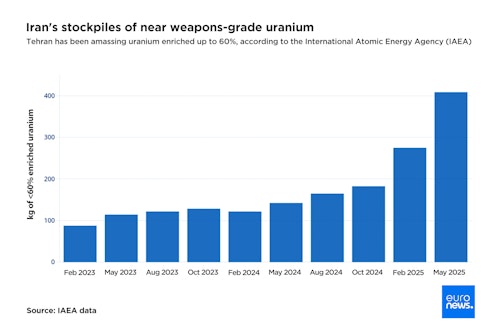
Iran has consistently claimed its nuclear programme is for “civilian” purposes only, and has defended its “non-negotiable” right to continue to enrich uranium.
How did the conflict between Israel and Iran escalate?
Israel and Iran’s decades-long shadow conflict erupted into open confrontation on Friday, as Israeli airstrikes targeted nuclear and military facilities deep inside Iran, killing at least seven senior military commanders and six top nuclear scientists.
But how did tensions reach this breaking point — and what are the key moments that have shaped this long-simmering conflict ? Read the full story below.
Timeline: How did the Israel-Iran conflict escalate?
Iran and Israel have spent over a decade trading cyberattacks, covert operations and military strikes, with tensions soaring in recent years over Iran’s nuclea…
Meanwhile, anti-Israel protesters gathered in the streets of Tehran
A photo tour of the protests rocking the Iranian capital following the Israeli attacks.
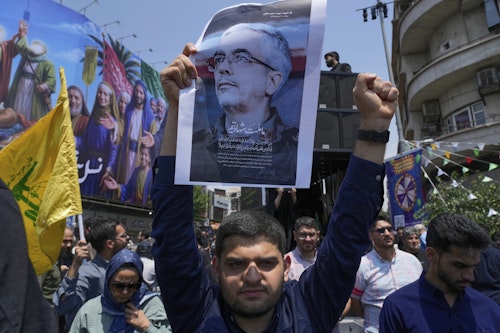
An Iranian protester holds up a poster of Chief of General Staff of the Armed Forces Mohammad Bagheri, who was killed in an Israeli strike, in an anti-Israeli gathering in Tehran, Iran, Friday, June 13, 2025. (AP Photo/Vahid Salemi)
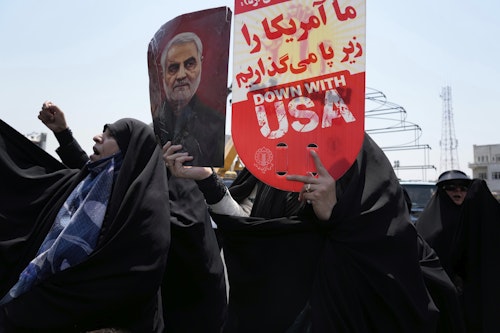
An Iranian protester holds up an anti-U.S. placard and a poster of the late revolutionary guard Gen. Qassem Soleimani, who was killed in a U.S. attack in Iraq in 2020, in an anti-Israeli gathering in Tehran, Iran, Friday, June 13, 2025. (AP Photo/Vahid Salemi)
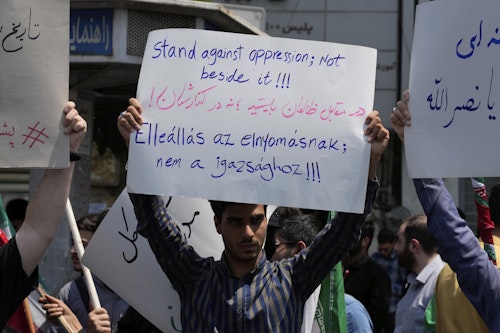
A protester holds up an anti-Israeli placard in a gathering in Tehran, Iran, Friday, June 13, 2025. (AP Photo/Vahid Salemi)
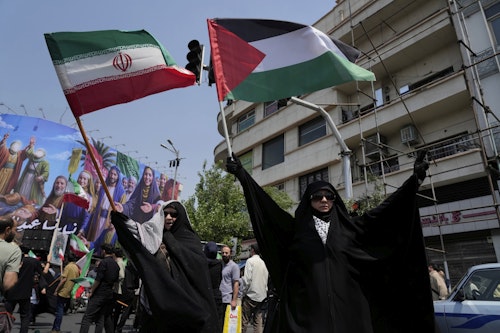
Iranian protesters hold up Iranian and Palestinian flags in an anti-Israeli gathering in Tehran, Iran, Friday, June 13, 2025. (AP Photo/Vahid Salemi)
Hundreds gathered in Tehran to protest against Israel and the recent strikes against Iran.
— euronews (@euronews) June 13, 2025
Demanding “revenge” and chanting slogans against Israel and the United States, the demonstrators gathered in the capital of the country at “Revolution Street." pic.twitter.com/4SSVYiw5fc
Iran’s president warns of strong action against Israel
Iranian President Masoud Pezeshkian has vowed a “strong” response to Israel following overnight airstrikes that hit military and nuclear sites across the country.
In a televised address on Friday, Pezeshkian called on Iranians to rally behind the country’s theocratic leadership.
“The Islamic Republic of Iran will give a severe, wise, and strong answer to the occupier regime,” he said, referring to Israel.
His comments echoed similar warnings from senior Iranian officials. Foreign Minister Abbas Araqchi, in a letter to the United Nations, described the Israeli strikes as “a declaration of war”.
Earlier, Iran’s Supreme Leader Ayatollah Ali Khamenei warned that Israel should expect “severe punishment” for the attacks. Soon after, Iran launched approximately 100 drones toward Israeli territory, which the IDF said they had intercepted.
Update: Who did Israel kill in its strikes on Iran?
The Israel Defence Forces (IDF) said on Friday that it had killed General Amir Ali Hajizadeh, the head of the Islamic Revolutionary Guard Corps' (IRGC) missile programme.
Iran has not officially confirmed his death, although speculation and unverified reports had been circulating online for some time.
Hajizadeh was a senior IRGC commander responsible for overseeing Iran’s ballistic missile arsenal.
The claim was part of a broader IDF announcement that it had killed several top Iranian officials in a wave of overnight airstrikes on what it described as nuclear and military targets. Among those named were Revolutionary Guard Commander Hossein Salami, Chief of Staff Mohammad Hossein Bagheri, and Emergency Forces Commander Gholam Rashid.
Iranian state media has confirmed the deaths of those officials, as well as Colonel Reza Ahmadi, head of Iran’s UAV Coordination Unit, and Brigadier General Rabani, deputy for operations at the General Staff of the Armed Forces. Reports have also speculated that Brigadier General Esmail Qaani, commander of the Quds Force, may be among the dead.
The IDF said it had also killed at least six nuclear scientists in the targeted airstrikes. One of those named by Iran was Mehdi Tehranchi.
Several relatively upscale neighbourhoods in northern Tehran were hit in the attack — areas that include government departments and military centres. Three residential buildings were reportedly destroyed.
Analyst: Israeli strikes likely intended to derail nuclear talks
Ellie Geranmayeh, deputy director for MENA at the European Council on Foreign Relations, has offered analysis on Israel’s overnight strikes on Iran, to which Tehran launched around 100 drones in response.
“The unprecedented Israeli attacks came 48 hours before US Special Envoy Steve Wifkoff was due to meet Iran’s foreign minister for a critical sixth round of nuclear negotiations. While some Israeli officials argue that these attacks aimed to strengthen the US leverage in the diplomatic path – it is clear their timing and large-scale nature was intended to completely derail talks.”
“There is broad consensus amongst Iran’s leadership that there must be a proportionate retaliation against Israel. Over the past year an internal debate took place in Iran on whether the country had made a strategic mistake in not responding more harshly to previous Israeli attacks. This weakened deterrence was compounded with the significant weaking of Iran’s key regional allies in Lebanon and the downfall of the Assad regime has left Iran more vulnerable."
“There is real question over the gravity with which Iran can mount a counter response against Israel given the weakened position of Hezbollah in launching strikes across the border. Iran has reportedly launched a wave of drone attacks against Israel, but these are unlikely to cause major damage. Iran is likely to however combine drone strikes with launching missile attacks aimed at overwhelming Israeli air defences.”
Geranmayeh advised European leaders to:
- Recognise that this was a major escalation initiated by Israel, aimed at provoking Tehran.
- Avoid being drawn into a conflict that risks European lives in the region.
- Assist the IAEA and Iran in safeguarding nuclear facilities and inspectors.
- Maintain diplomatic backchannels with Iran and step up coordination with GCC states and the US to preserve the nuclear negotiations track.
Iran calls for UN Security Council action after Israeli attacks
Iran’s Foreign Ministry condemned Israeli strikes on Tehran and other cities as a “criminal and evil” violation of its sovereignty. The statement to the UN brands the attacks a “blatant act of aggression” and a breach of Article 2(4) of the UN Charter - the article prohibiting use or threats of force against the territorial integrity or political independence of another state.
Tehran reaffirmed its “legitimate and legal right to respond” under Article 51 and warned the consequences of Israel’s actions “will rest entirely upon this regime and its supporters”.
Iran called on the UN Security Council to “take immediate action” against Israel’s “violation of international peace and security”, urging the Secretary-General to intervene.
The Ministry also held the US responsible as “the primary patron” of Israel, warning Washington will share the blame for the fallout.
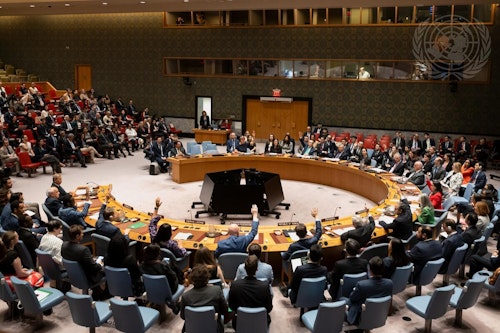
UN Security Council on the situation of the Middle East (04/06/2025)
Flight tracking site shows impact of closed airspace
Flight tracking site Flightradar24 shows how airlines have been diverting flights over Israel, Iran, Iraq and Jordan on Friday.
In Israel, Tel Aviv’s Ben Gurion Airport has been closed while the main carrier El Al Airlines has said it has suspended all flights into and out of Israel.
Iran has also closed down its airspace until further notice, according to the country's state television.
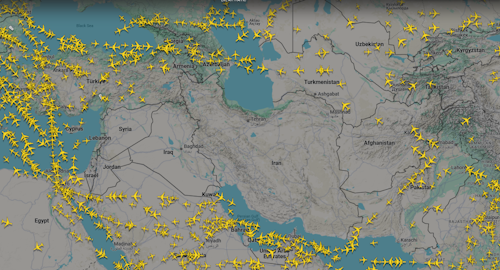
Trump urges Iran to make nuclear deal, says next planned attacks would be 'even more brutal'
US President Donald Trump has urged Iran to strike a deal over its nuclear programme, warning that further conflict with Israel could bring even greater devastation.
"I gave Iran chance after chance to make a deal. I told them, in the strongest of words, to ‘just do it’, but no matter how hard they tried, no matter how close they got, they just couldn’t get it done," Trump said in a statement.
"I told them it would be much worse than anything they know, anticipated, or were told — that the United States makes the best and most lethal military equipment anywhere in the world, by far, and that Israel has a lot of it, with much more to come. And they know how to use it."
He added: "There has already been great death and destruction, but there is still time to make this slaughter — with the next already planned attacks being even more brutal — come to an end."
Trump concluded by urging Iran to negotiate to "save what was once known as the Iranian Empire".
Shortly after the Israeli strikes began, US Secretary of State Marco Rubio denied that Washington was involved in the operation. "We are not involved in strikes against Iran and our top priority is protecting American forces in the region," Rubio said. "Let me be clear: Iran should not target US interests or personnel."
Despite that statement, Iranian state media claimed the US was complicit in the attacks. Israel's public broadcaster Kan reported that Israeli officials had informed the US in advance of the strikes.
Donald J. Trump (@realDonaldTrump)
I gave Iran chance after chance to make a deal. I told them, in the strongest of words, to “just do it,” but no matter how hard they tried, no matter how close…
Israeli Air Force says it destroyed 'dozens' of Iran's air defence systems
The Israeli Air Force (IAF) said it carried out a "large-scale strike" targeting Iran’s air defence systems, destroying "dozens" of radar installations and surface-to-air missile launchers.
The operation, part of the broader campaign known as Operation Rising Lion, aims to degrade the military capabilities of Iran and its regional proxies. According to the IDF, the strikes focused on both military infrastructure and nuclear sites.
Israel said that more than 200 fighter jets participated in the operation, which reportedly killed several high-ranking Iranian officials — including the Chief of Staff of the Iranian Armed Forces, the Commander of the Islamic Revolutionary Guard Corps (IRGC), and the Commander of Iran’s Emergency Forces.
Among the key targets was the Natanz nuclear facility, Iran’s largest uranium enrichment site. The IAF said fighter jets, guided by “precise intelligence,” struck critical parts of the complex. Both Iranian authorities and the IDF confirmed damage to the site, though nuclear experts say there is no current evidence of radioactive contamination beyond the facility.
Iran names replacements for top commanders killed in Israeli strikes
Iran's Supreme Leader, Ayatollah Ali Khamenei, has replaced two top military commanders killed in a wave of Israeli strikes across the country on Friday.
Iranian state TV said he picked General Abdolrahim Mousavi as the new head of the armed forces, replacing Gen. Mohammad Bagheri. Mousavi was previously the top army commander.
Khamenei chose Mohammad Pakpour to lead the paramilitary Revolutionary Guard, replacing General Hossein Salamii.
Israeli strike hits Iranian military site near Tabriz, according to Iran state media
According to Iran’s state-run Islamic Republic News Agency (IRNA), the city of Tabriz in northwestern Iran has been targeted by Israeli military forces.
Separately, the semi-official Tasnim news agency reported that the explosion occurred near Tabriz airport. The strike is believed to have hit the Shahid Fakouri military airbase.
What is Israel's Iron Dome air defence system and why it is so effective?
Israel says it intercepted around 100 drones launched from Iran on Friday — a major test for one of the world’s most advanced air defence systems. The Iron Dome, which has been operating since 2011, is a key part of Israel's military strategy.
What makes it so effective? Read more below.
What are Israel’s air defences? And why are they so effective?
Israel claims it intercepted all of the drones launched by Iran after Israel hit Tehran’s military command and top nuclear scientists and facilities overnight…
Inside Israeli intelligence’s plot: how the Mossad orchestrated the attacks in Iran
In the night between Thursday and Friday, the foreign Israeli secret services, known as the Mossad, operated in “central Iran” to deploy operational systems with “precision-guided weaponry", an Israeli intelligence source told Euronews on condition of anonymity.
The information was also reported by AP and Israeli media, however, Euronews was unable to independently verify the information.
“They were positioned in open areas near Iranian surface-to-air missile systems,” the source added.
The system was activated when the Israeli military offensive began, and the launch of precision-guided missiles occurred, the intelligence source said.
In a separate operation, the Mossad secretly installed “strike systems and advanced technologies on vehicles”, in order to “neutralise Iranian air defence capabilities” that Israel said were threatening fighter jets.
These systems were activated “at the onset of the surprise attack” the Israeli intelligence source said, “launching weapons that completely destroyed Iranian air defence targets”.
A third campaign was also launched, with the Mossad operating well in advance of last night's operation. The secret services established “a base for explosive drones” deep into Iran, the source said.
“During the Israeli strike, these drones were activated and launched toward surface-to-surface missile launchers at the Esfajabad base near Tehran,” the Israeli intelligence concluded.
Read more in the article below.
by Eleonora Vasques
Israel’s Mossad struck multiple targets deep inside Iran, sources say
The Israeli Mossad used advanced systems and explosive drones to hit multiple targets in Iran, including air defence systems and missile launchers near Tehran.
Experts verify videos of strikes circulating on social media
Euronews’ verification team, Euroverify, has been looking at footage claiming to show Israeli strikes on Iran circulating on social media.
One video showing an explosion erupting in the distance, seemingly filmed from a residential area, has been shared widely on X, Facebook and Telegram.
Experts for GeoConfirmed, a volunteer-driven open-source intelligence (OSINT) project, have located the strike near Pianshahr, a city in Iran’s West Azerbaijan province, near the border with Iraq.
We have been able to verify their work by using satellite imagery of Pianshahr.
Our analysis suggests the video of the strike was indeed filmed in a location in the north of the city.
The Institute for the Study of War (ISW) has confirmed a reported explosion with footage in the same location.
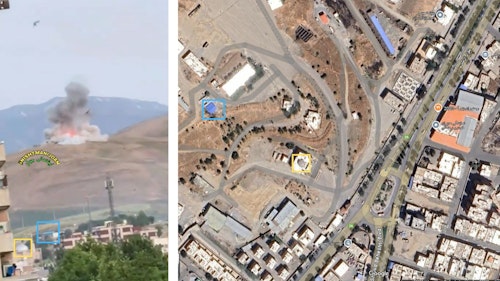
The image above shows a screenshot of a video circulating on social media geo-located by experts as Piranshahr, Iran. Sources: Geoconfirmed, Google Earth.
Reactions: European leaders voice alarm and call for immediate de-escalation
Two main messages are coming from European capitals this morning.
First, a deep sense of alarm over the attacks launched overnight between Israel and Iran. Second, mounting calls for restraint and de-escalation to prevent what many leaders fear could turn into an all-out, unpredictable war in the Middle East.
Due to the geographic location of the Middle East, any development in the region can have major repercussions for Europe, as it happened during the Syrian Civil War, which prompted a mass exodus of asylum seekers towards the continent.
We recap the main political reactions.
European leaders urge immediate de-escalation between Israel and Iran
The military attacks between Israel and Iran have caused alarm across Europe, with leaders calling on both parties to immediately de-escalate.
Israel lifts shelter orders
Israel has announced that citizens are no longer required to remain near protected spaces — a precaution that had been imposed earlier in anticipation of an Iranian response to Israeli strikes.
Earlier in the day, the IDF instructed residents to seek shelter after launching a widespread military operation targeting Iran.
The IDF said it intercepted around 100 drones launched by Iran toward Israeli territory. In parallel, Israel’s Air Force (IAF) reported it had destroyed "dozens" of radar systems and surface-to-air missile launchers as part of its strikes on Iran’s air defence infrastructure.
The IAF described the assault as a “large-scale strike,” calling it part of a continuing effort to degrade Iran’s air defence capabilities.
France's Macron holding emergency meeting
French President Emmanuel Macron is this morning holding a Defence and National Security Council, the Elysée Palace has announced.
The meeting started at 11:00 Paris time and is "dedicated to the situation in the Middle East", the presidency said.
Macron has not yet reacted publicly to Israel's overnight strikes on Iran.
Watchdog: Nuclear sites should never be attacked
The head of the International Atomic Energy Agency (IAEA), the UN’s nuclear watchdog, on Friday described Israeli strikes on Iran’s nuclear facilities as “deeply concerning.”
Rafael Grossi told board members that he has “repeatedly stated that nuclear facilities must never be attacked, regardless of the context or circumstances, as it could harm both people and the environment.”
Such attacks, he warned, carry “serious implications for nuclear safety, security, and safeguards, as well as regional and international peace and security.” Grossi urged all parties to exercise “maximum restraint”.
According to Grossi, Iran’s main enrichment facility at Fordow was not hit in the strikes, and a site in Isfahan also appeared unaffected, based on information from Iranian authorities.
However, Israeli strikes reportedly targeted a nuclear complex at Natanz — one of Iran’s primary uranium enrichment facilities, located about 250 km south of Tehran. The site includes a large underground enrichment hall and a smaller above-ground plant.
The extent of the damage at Natanz remains unclear. Iran’s Atomic Energy Organization said “several parts of the facility” were damaged, though no elevated radiation levels have been detected so far.
Grossi said he is prepared to travel to Iran to personally assess the situation.
My statement to the @IAEAorg Board of Governors today on the situation in Iran.pic.twitter.com/oDUXA6nWlD
— Rafael Mariano Grossi (@rafaelmgrossi) June 13, 2025
Von der Leyen urges 'maximum restraint'
We've just heard the first reaction from Ursula von der Leyen, the president of the European Commission.
In a short statement, which doesn't mention either Israel or Iran by name, von der Leyen says that "reports from the Middle East are alarming".
"Europe urges all parties to exercise maximum restraint, de-escalate immediately and refrain from retaliation," von der Leyen wrote.
"A diplomatic resolution is now more urgent than ever, for the sake of the region's stability and global security."
The reports emerging from the Middle East are deeply alarming.
— Ursula von der Leyen (@vonderleyen) June 13, 2025
Europe urges all parties to exercise maximum restraint, de-escalate immediately and refrain from retaliation.
A diplomatic resolution is now more urgent than ever, for the sake of the region's stability and global…
Head of EU diplomacy call for a de-escalation and diplomatic solutions
Kaja Kallas, former Estonian prime minister and now the EU’s High Representative for Foreign Affairs, has expressed hope for an end to the escalating conflict. In a brief statement on X, she called for restraint and urged all sides to avoid further violence.
The situation in the Middle East is dangerous.
— Kaja Kallas (@kajakallas) June 13, 2025
I urge all parties to exercise restraint and prevent further escalation.
Diplomacy remains the best path forward, and I stand ready to support any diplomatic efforts toward de-escalation.
Who has the advantage? A look at Iran and Israel’s military forces
In terms of manpower, Iran holds a clear advantage. It fields over 610,000 active personnel, including members of the Islamic Revolutionary Guard Corps (IRGC), which has its own command structure and operates independently from the regular army. Israel, by contrast, maintains a much smaller active force of 169,500 troops, though it compensates with a large and well-trained reserve force of 465,000, compared to Iran’s 350 000. This reflects Israel’s rapid capacities of mobilisation in times of conflict.
But when it comes to spending, Israel pulls ahead. In 2023, Israel allocated $27.5 billion to defence - more than double Iran’s $10.3 billion budget. That funding translates into a technological edge, especially in the air. Israel possesses 340 combat-capable aircraft, many of them state-of-the-art American models such as the F-35 stealth fighter. Iran, while not far behind in numbers — with 312 aircraft, plus an additional 23 operated by the IRGC — largely relies on ageing Russian-made Sukhoi and MiG jets, many of which are considered outdated by modern standards.
Both countries have heavily invested in air defence systems. Israel’s multi-layered protection, including the Iron Dome, David’s Sling, and Arrow systems — is regarded as among the most advanced in the world. Iran, meanwhile, has prioritised domestic development, fielding systems such as the Bavar-373, the Khordad, and Russian S-300 units. While capable, their effectiveness against a highly advanced air force like Israel’s remains uncertain.
Iran’s strength is more pronounced in ground firepower. It reportedly has over 6,798 artillery units, dwarfing Israel’s 530. This suggests Tehran could be better prepared for large-scale, prolonged land operations. Israel, instead, leans on speed, precision, and coordination between its air and ground forces.
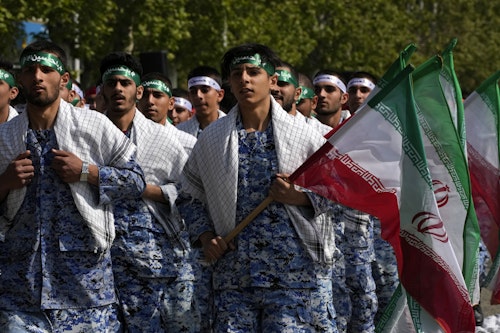
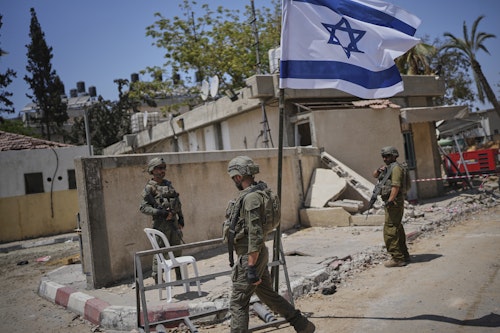
Former IRGC commander: Attacks may continue for weeks
Mohsen Sazegara, a political analyst and former commander in Iran’s Revolutionary Guards, told Euronews Persian that Israel’s strike on nuclear sites was not a limited operation but part of a broader “series of complex military and intelligence actions that may continue for weeks.”
Sazegara said Iran’s response will likely depend on the full extent of the damage.
The IDF claimed its strikes, which targeted the "heart" of Iran’s nuclear programme, killed at least six nuclear scientists, as well as senior figures in the Revolutionary Guards, including Commander Hossein Salami and Chief of Staff Mohammad Hossein Bagheri.
Sazegara noted that the Islamic Republic has previously relied on missiles and drones in its responses to Israel, adding that any potential use of hypersonic missiles could significantly escalate the conflict.
He also said the strikes exposed vulnerabilities in Iran’s nuclear infrastructure, despite official claims to the contrary. A weak or delayed response, he warned, could lead to internal blame within the armed forces, possibly directed at Supreme Leader Ayatollah Ali Khamenei.
“The pressure and blame will ultimately fall on the Supreme Commander,” he said. “That may be what pushes Khamenei to act — to avoid the appearance that the system has failed.”
Israel ready to 'eliminate' its foes, Defence Minister Katz says
Israel’s Defence Minister, Israel Katz, said the country was prepared to "eliminate" its enemies after launching airstrikes on Iran targeting nuclear sites.
“The precise targeting of senior commanders of the Revolutionary Guards, the Iranian military, and nuclear scientists — all of whom were involved in advancing the plan to destroy Israel — sends a strong and clear message: those who work toward Israel’s destruction will be eliminated,” Katz said in a statement.
He added that Iran would "pay an increasingly heavy price the longer it continues its aggressive actions."
Earlier, Iran’s Supreme Leader Ayatollah Ali Khamenei threatened Israel with "severe punishment" ahead of what the IDF said was the interception of around 100 drones launched toward Israeli territory.
Jordan actively intercepting missiles and drones, state media says
Sirens sounded across parts of Jordan earlier as tensions between Israel and Iran intensified. Jordanian state media has since reported that the country’s air force is actively intercepting missiles and drones entering its airspace.
According to the state news agency, a senior military official — speaking on condition of anonymity — said the interceptions were based on assessments indicating that the projectiles were likely to land within Jordanian territory, including populated areas, posing a potential threat to civilian safety.
The official added that the Jordan Armed Forces are operating “around the clock to defend the country’s borders by land, sea, and air,” and emphasised that “any violation of Jordanian airspace will not be tolerated under any circumstances.”
France urges restraint and reaffirms 'Israel's right to defend itself'
French Foreign Minister Jean-Noël Barrot called for restraint and de-escalation in the Middle East as tensions continue to rise between Iran and Israel.
France is "following developments with the greatest attention, in close coordination with its partners," the foreign ministry said in a statement.
"We have repeatedly expressed our serious concerns regarding Iran's nuclear programme, notably in the resolution recently adopted at the International Atomic Energy Agency (IAEA)," the statement continued. The resolution, passed earlier this month, formally censured Iran for its lack of cooperation with nuclear inspectors and called on Tehran to increase transparency around its enrichment activities.
France also reaffirmed its support for Israel’s right to defend itself in the event of an attack.
Separately, Israel’s ambassador to France, Joshua Zarka, told RTL radio that Israel had not informed Paris in advance of the strikes. “The French state, for a certain period, is not as close as it was before,” Zarka said, referring to diplomatic ties between the two countries.
Lufthansa, Aeroflot and Qatar Airways suspend flights
A number of airlines — including Germany’s Lufthansa, Aeroflot, and Qatar Airways — have announced the suspension of flights to and from Tehran, citing a deteriorating security situation following Israeli strikes on Iranian territory.
Israeli airline Israir Airlines also said on Friday it was evacuating and relocating its aircraft from Tel Aviv’s Ben Gurion Airport. The move is part of a contingency plan developed in recent days in response to the situation, the company said.
Tel Aviv's Ben Gurion airport is closed until further notice, Reuters reports.
Israel should expect severe punishment, Iran's supreme leader says
Earlier, Iran’s Supreme Leader Ayatollah Ali Khamenei said Israel should expect “severe punishment” following overnight strikes that targeted nuclear sites.
Several people were killed in the strikes, according to the IDF, including Revolutionary Guard Commander Hossein Salami, Chief of Staff Mohammad Hossein Bagheri, Emergency Forces Commander Gholam Rashid, and at least six top nuclear scientists.
Khamenei warned that Iran’s military forces “wouldn’t let the strikes go unpunished.”
“With this crime, the Zionist regime has prepared for itself a bitter, painful fate, which it will definitely see,” he said.
Since his remarks, Iran has launched approximately 100 drones toward Israel, according to the IDF.
That [Zionist] regime should anticipate a severe punishment .By God’s grace, the powerful arm of the Islamic Republic’s Armed Forces won’t let them go unpunished.
— Khamenei.ir (@khamenei_ir) June 13, 2025
Time for restraint, Starmer says
British Prime Minister Keir Starmer has called on both sides to "step back and reduce tensions urgently."
"Stability in the Middle East must be the priority and we are engaging partners to de-escalate. Now is the time for restraint, calm and a return to diplomacy."
United Nations Secretary-General António Guterres echoed Starmer's calls, saying he "condemns any military escalation in the Middle East." His spokesperson recalls the obligation of "UN Member States to act in accordance with the UN Charter and international law."
“The Secretary-General asks both sides to show maximum restraint, avoiding at all costs a descent into deeper conflict, a situation that the region can hardly afford,” a statement reads.
The US has said it is not involved in Israel's strikes. President Donald Trump reiterated to Fox News anchor Bret Baier he had no prior knowledge of Israel's plans. “Iran cannot have a nuclear bomb. We’ll hopefully get back to the negotiating table,” Trump said, according to Baier. “There are several people in leadership in Iran who will not be coming back."
Israeli hospital in ‘full emergency mode’
Hadassah Hospital, one of Israel’s largest hospitals, says it is in “full emergency mode.”
It's releasing patients whose conditions permit, cancelling non-urgent operations and moving some departments to protected areas.
Pictures show damage in Iran after Israeli strikes
Israel launched strikes across Iran last night it said targeted its nuclear programme. Here are some pictures from Tehran this morning :
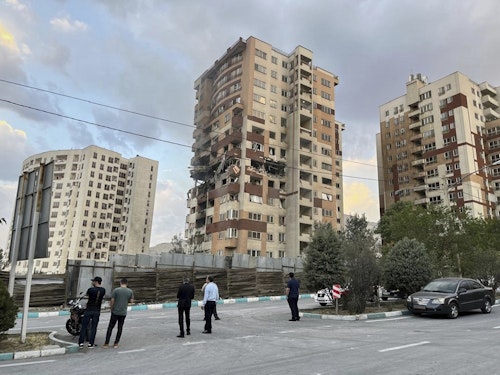
Residents watch a damaged apartment in Tehran.
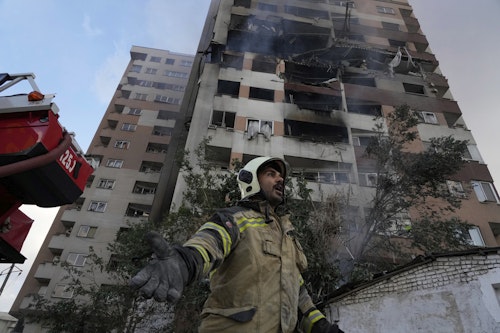
A firefighter calls out his colleagues at the scene of an explosion in a residence compound in northern Tehran.
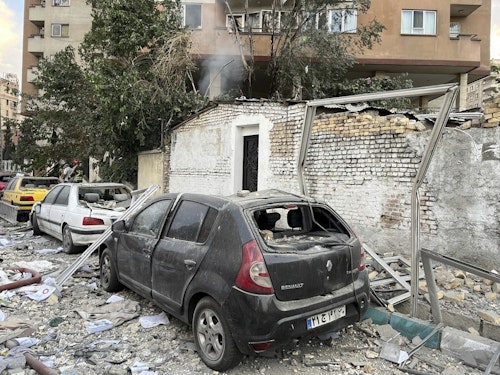
Debris from an apartment building is seen on top of parked cars in Tehran.
What's happened so far
Welcome to our live blog. If you are joining us now, here's what you need to know so far:
- The IDF says Iran has launched about 100 drones towards its territory, after Israel launched strikes across Iran overnight it said targeted the "heart" of Iran's nuclear programme.
- The strikes have killed Hossein Salami, chief of Iran's Islamic Revolutionary Guards, as well at least six nuclear scientists, according to Iranian state media.
- Israel's President Benjamin Netanyahu said that the strikes were a "targeted military operation to roll back the Iranian threat to Israel's very survival". He said, "if not stopped, Iran could produce a nuclear weapon in a very short time." He has declared a state of emergency.
- The US was not involved in the strikes, according to Secretary of State Marco Rubio.
- Iran's Supreme Leader, Ayatollah Ali Khamenei, said Israel should expect "severe punishment" as a response to the strikes.











